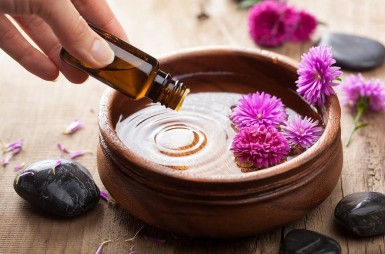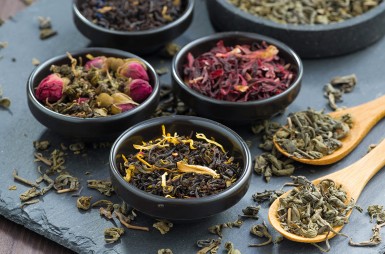Herbalism:
the benefits of plants for our body
Written by Paul Musset, Doctor in Pharmacy | published on | updated on 17/04/2024

Plants are not made just to be pretty ornaments. Herbalism, the field of taking the best of plants to prepare natural remedies proves it. Plants used in this field are very numerous and have dozens of different applications, to address minor health concerns. Sleeping difficulties, problems with digestion: which plants can soothe our everyday ailments?
What is herbalism and herbal medicine?
How to use them?
Herbal teas and infusions
In herbalism, herbal teas are taken orally: the goal is to infuse the dried plants in hot water, then drink them. They are preferably consumed hot, and have both medicinal and taste benefits. Herbal teas are prescribed for multiple minor health concerns, depending on the plant or plants that make it up. One can also use herbal teas which are a mixture of plants with complementary benefits, for example a complex for digestion or promoting sleep. Indeed, in terms of available format, there are herbal tea bags, to put straight into a mug of hot water, or loose teas to be used in a teapot.
Inhalations
Inhalations are used to unclog the respiratory tract. The plants are used with hot water, which will later turn into steam: this is what is inhaled. To prepare an inhalation, the first step is to infuse the plants in a large bowl filled with hot water, then let them stand for a few minutes, before placing your head above the bowl and covering it with a towel. You just need to inhale the scent of the plants in the water for a few seconds, take a break, and then start again. Note that the plants used in inhalation can also be drunk in herbal tea, as is the case for thyme in particular.
What precautions should I take?
Although natural, plants are not harmless to health. It is important to respect the doses prescribed on your herbal tea package or by your herbalist. For example, in the case of a diuretic herbal tea, disturbances to the digestive and urinary systems can be caused by excessive consumption. Similarly, certain herbal teas are not recommended for children. Finally, keep in mind that an infusion or inhalation is not a drug, and it does not replace a prescribed medicine. In case of severe and / or persistent ailments, it is recommended to consult a doctor.
Also think about essential oils and Ayurvedic blends!
Do you want to treat yourself with herbal remedies? Don’t forget to also think about aromatherapy and especially essential oils! The latter, very concentrated, are used externally (skin) or internally. Discover also Ayurvedic blends, infusions with herbal and spice complexes that work together to harmonise body and mind by stimulating them.
Choose the right plant for your needs
Detox and slimming
There are a number of detox, fat-burning and slimming herbal teas. Fat burners stimulate the body to burn calories more efficiently. These herbal teas are most often made from caffeine or green tea. There are others which are recommended for flat stomachs: these have diuretic and detox effects. Their diuretic effect makes it possible to fight against water retention and therefore to shape the body in certain places, including the stomach, where the water would have caused swelling, or even cellulite. Diuretic products often contain dandelion, artichoke and fennel.
Regulate digestion or indigestion
Herbal teas and infusions for indigestion act on the digestive system. Peppermint, but also lemon and liquorice are often used to regulate indigestion and improve digestion. These can be used on a regular basis to treat recurrent ailments, or alternatively on an ad hoc basis (to relieve bloating, for example).
Increase energy
Amongst the tisanes designed to improve energy and concentration, we often find infusions based on turmeric and / or ginger, both known for their ability to boost the immune system. Cinnamon is also used because it helps to improve mental and physical capacities. Finally, to boost concentration, ginger and ginseng are also recommended as herbal teas or infusions.
Difficulty with sleeping
To improve sleep and to help achieve it, the most used plants are chamomile, known for its soothing and calming properties, as well as verbena and lemon balm. In addition, they have a tasty taste, perfect to be enjoyed in the evening, after meals and before bedtime.
Improve blood circulation
Herbal teas recommended for improving blood circulation in the body are made from red grapes and hawthorn. Good to know, herbal teas with red fruits are also recommended for breastfeeding women, to promote milk production.
Anti stress
Anti-stress infusions use plants with soothing properties. We often find lavender and lime, reputed to be relaxing. These herbal teas are recommended in the event of temporary stress, in order to regain serenity. They are also perfect coupled together for a relaxing effect. They are indeed similar to herbal teas for difficult sleeping difficulties.
Breathing
Finally, the herbal teas and / or inhalations to improve breathing and help unclog the respiratory tract are generally based on thyme, or even just thyme. It helps with breathing by soothing and purifying the respiratory tract, especially when you have a cold or stuffy nose. You can also use rosemary and eucalyptus for the same effects, or a mixture of these 3 plants.
In addition to traditional medicine, herbal products can help you respond to specific needs in a natural way or soothe certain ailments. The plants that are beneficial to our organism are therefore to be taken for prevention or treatment for a few days.
The three key points to remember about herbalism:
- Herbal teas and infusions are recommended to improve digestion, help you fall asleep or reduce stress;
- Inhalations help to unblock the respiratory tract thanks in particular to thyme or rosemary;
- Detox or slimming infusions contain dandelion or artichoke and have a diuretic effect.
































